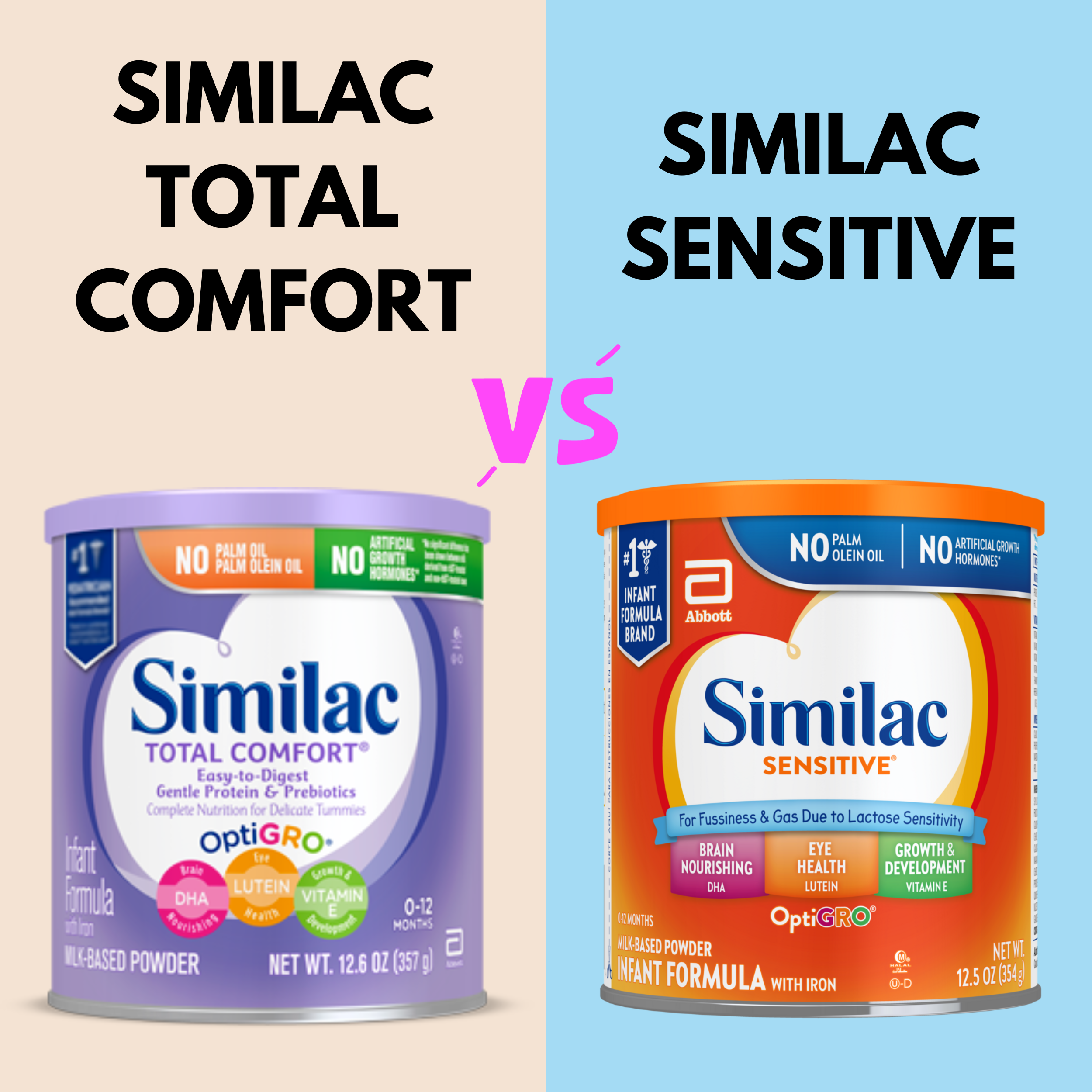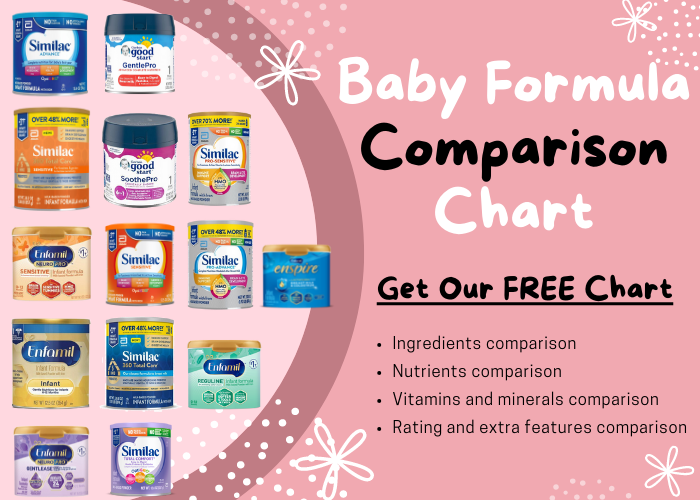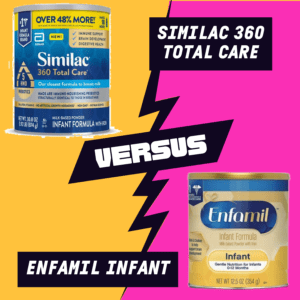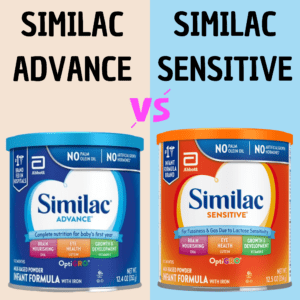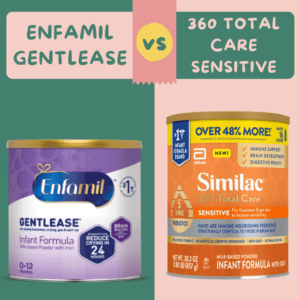What is The Difference Between Similac Sensitive and Total Comfort:
Similac Sensitive is an affordable option with 99% lactose reduction and more casein suitable for fussiness and reflux. In contrast, Similac Total Comfort is 100% whey partially hydrolyzed and lactose-reduced by 99%, addressing gas, colic, and promoting regular bowel movements.
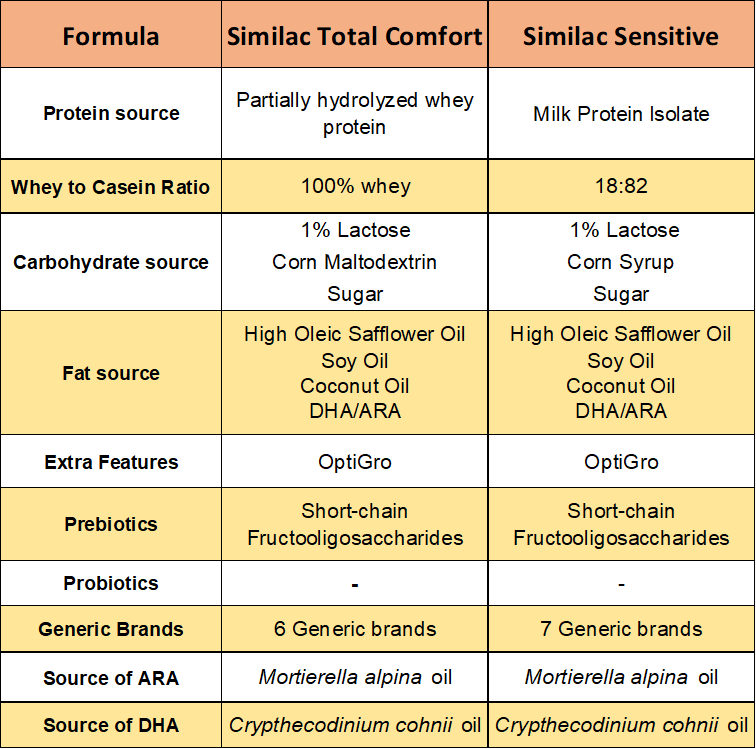
“When you buy something using my links, I may earn a small commission at no additional cost to you. This is a kind of support to me. This website doesn’t accept money for reviews. “
The Best One?
The choice between Similac Sensitive and Similac Total Comfort depends on your baby’s individual needs and sensitivities. There is no one-size-fits-all answer, as what works best for one baby may not be suitable for another. Here are some considerations to help you make an informed decision:
- Milk Allergy: For babies with milk allergies, Similac Total Comfort is an ideal choice due to its partially hydrolyzed whey protein, making it easier to digest for sensitive stomachs.
- Casein Allergy: Babies with casein allergies can benefit from Similac Total Comfort, as it’s composed entirely of whey protein.
- Whey Allergy: If your baby has a whey allergy, Similac Sensitive is the best option, as it contains 82% casein protein.
- Reflux and Fussiness: For babies experiencing reflux and fussiness, Similac Sensitive is a suitable choice (according to parent’s experience).
- Gas, Colic, and Bowel Issues: Similac Total Comfort is a good starting point for babies with gas, colic, or irregular bowel movements (according to parent’s experience).
- Lactose Allergy: Both formulas, Similac Sensitive and Similac Total Comfort, are suitable for babies with lactose allergies as they are lactose-reduced by 99%.
- Price: Similac Sensitive stands out as a cost-effective option, offering various sizes and forms to accommodate different needs.
Mom’s Reviews Comparison:
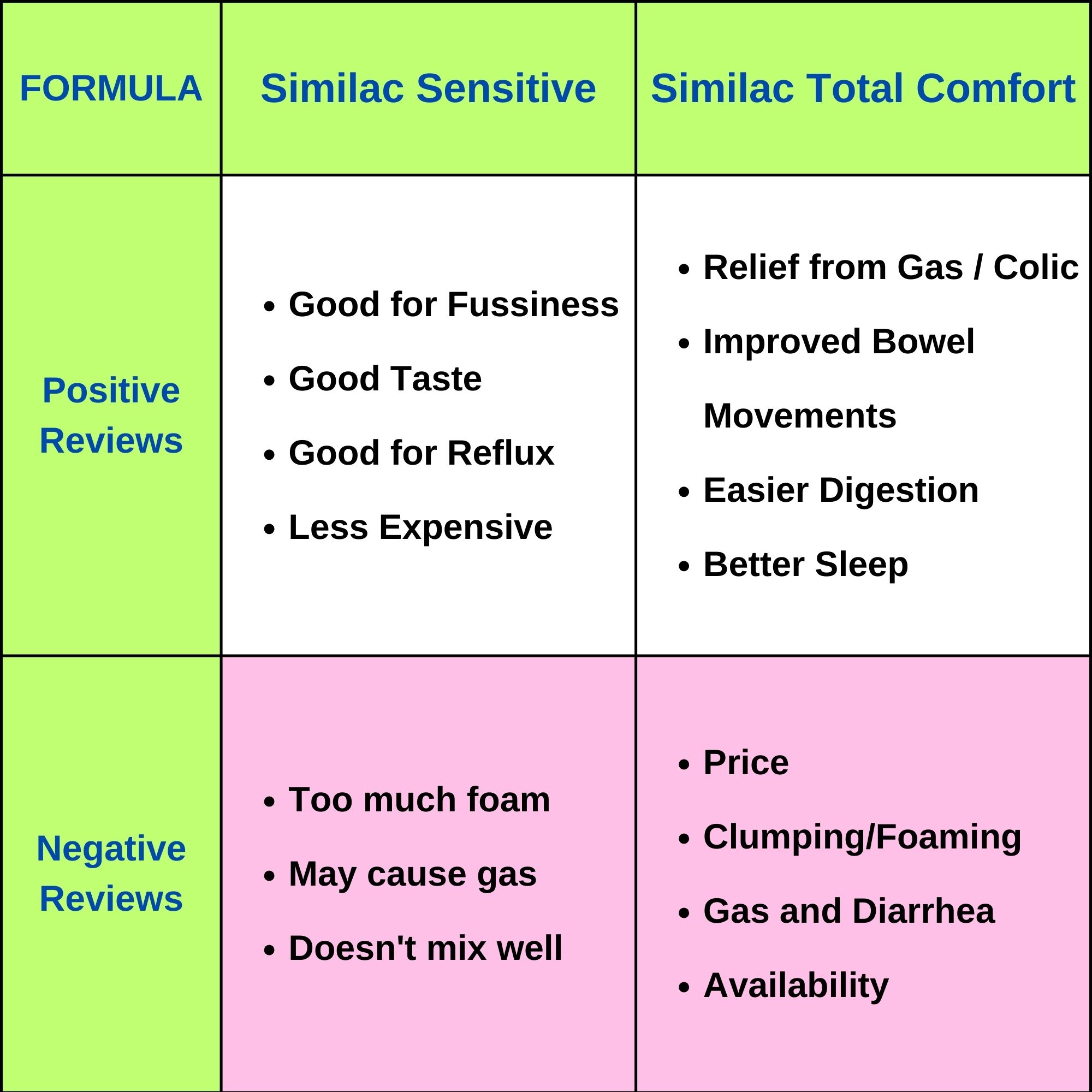
Similac Total Comfort:
Positive Reviews:
Relief from Gas and Fussiness: Many parents mentioned that Similac Total Comfort helped reduce gas and colic in their babies, making them less fussy and more comfortable.
Improved Bowel Movements: Several reviews noted that this formula resulted in regular and easier bowel movements for their babies.
Easier Digestion: Parents appreciated that this formula was gentle on their baby’s digestive system and seemed to be well-tolerated, reducing issues like reflux and stomach discomfort.
Better Sleep: Some parents noted that their babies started sleeping better after switching to Similac Total Comfort, indicating that it may have reduced discomfort and fussiness during the night.
Negative Reviews:
Price: One of the most common negative comments was about the cost of Similac Total Comfort, with many parents finding it expensive, especially when used long-term.
Formula Clumping and Foaming: Several reviews mention that Similac Total Comfort tends to clump when mixed, making it challenging to prepare the formula smoothly.
Gas and Diarrhea: A few parents reported that their babies experienced gas and diarrhea while using this formula, which was a concern for them.
Availability: Parents mentioned difficulties in finding Similac Total Comfort in stores, especially in bulk quantities, making it less convenient and potentially leading to shortages.
Similac Sensitive:
Positive Reviews:
- Good for Fussiness: Many moms have reported that Similac Sensitive effectively helps alleviate fussiness in their babies, indicating that it can be soothing for infants with sensitive stomachs.
- Good Taste: Some parents appreciate that their babies seem to enjoy the taste of Similac Sensitive, which can make feeding a more pleasant experience.
- Good for Reflux: Similac Sensitive has received positive feedback for its ability to reduce reflux symptoms in some infants.
- Less Expensive: Some parents find Similac Sensitive to be a cost-effective option for addressing their baby’s digestive issues, which can be a significant benefit for budget-conscious families.
Negative Reviews:
- Mixing: it is too foamy and sometimes it’s hard to mix it. The solution to this problem is to use Dr. Brown bottles because it mixes well and the bubbles are no longer found especially if you swirl the bottle.
- May cause gas: some parents reported that it might contribute to gas in some babies. these babies need a more sensitive formula.
Related: Similac Total Comfort Vs. Enfamil Gentlease
Ingredients Comparison:
When comparing Similac Sensitive and Similac Total Comfort in terms of ingredients, it’s essential to consider the protein source, whey to casein ratio, carbohydrate source, fat source, extra features, prebiotics, probiotics, and the sources of ARA and DHA. Here’s a detailed comparison:
Protein Source:
- Similac Sensitive: This formula derives its protein from Milk Protein Isolate. Milk protein isolate is a high-quality source of protein that contains both whey and casein proteins. Casein, in this case, constitutes 82% of the total protein content.
- Similac Total Comfort: Similac Total Comfort uses Partially Hydrolyzed Whey Protein as its primary protein source. Partially hydrolyzed means that the proteins have been broken down into smaller, more digestible fragments, making it a suitable choice for infants with sensitive tummies. Additionally, this formula is 100% whey-based, which can be gentler on some babies’ digestive systems.
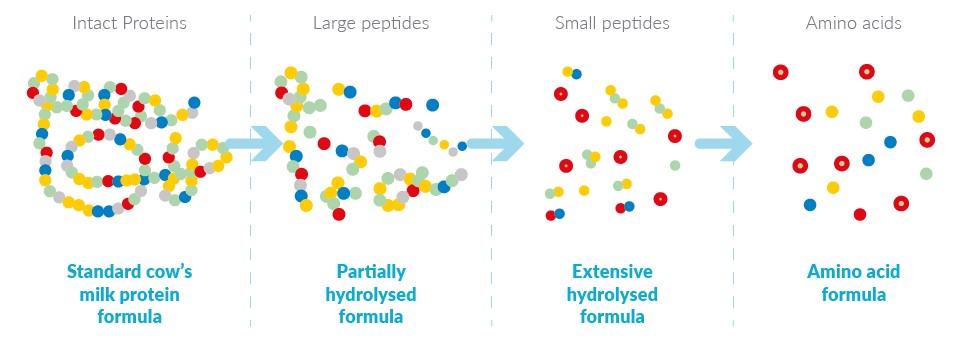
Whey to Casein Ratio:
- Similac Sensitive: It has a whey-to-casein ratio of 18:82, indicating a higher proportion of casein proteins. Casein tends to be slower to digest, which may be suitable for some infants but might lead to digestive discomfort in others.
- Similac Total Comfort: With a 100% whey composition, this formula offers a more balanced and easily digestible whey-dominant protein profile. This can be beneficial for infants who are prone to digestive issues.
Carbohydrate Source:
- Similac Sensitive: Its carbohydrate sources include 1% Lactose, Corn Syrup, and Sugar. The presence of lactose, a naturally occurring sugar in milk, is balanced with the addition of corn syrup and sugar, providing a source of easily digestible energy for babies.
- Similac Total Comfort: This formula also contains 1% lactose but adds Corn Maltodextrin and Sugar to the mix. Maltodextrin is a carbohydrate derived from corn, and the inclusion of sugar contributes to the carbohydrate content.
Extra Features:
- Both Similac Sensitive and Similac Total Comfort incorporate OptiGro, a proprietary blend of ingredients (DHA, Lutein, and Vitamin E) designed to support brain and eye development, as well as overall growth. These additional nutrients are essential for the healthy development of your baby.
Prebiotics:
- Both formulas include short-chain Fructooligosaccharides (FOS) as prebiotics. FOS serves as food for beneficial gut bacteria and can help support a healthy digestive system in infants.
Probiotics:
- Neither Similac Sensitive nor Similac Total Comfort includes probiotics. Parents looking to introduce probiotics to their baby’s diet may need to consider supplemental options separately.
Generic Brands:
- Similac Sensitive has 7 generic brands available in the market, offering cost-effective alternatives. Read Best 7 Generic Brands For Similac Sensitive.
- Similac Total Comfort also has 6 generic brands available, providing budget-friendly choices for parents. Read Best 6 Generic Brands of Similac Total Comfort.
Source of ARA (Arachidonic Acid) and DHA (Docosahexaenoic Acid):
- Both formulas source ARA and DHA from Mortierella alpina oil and Crypthecodinium cohnii oil, respectively. These essential fatty acids are crucial for brain and eye development in infants.
Nutrients Comparison:
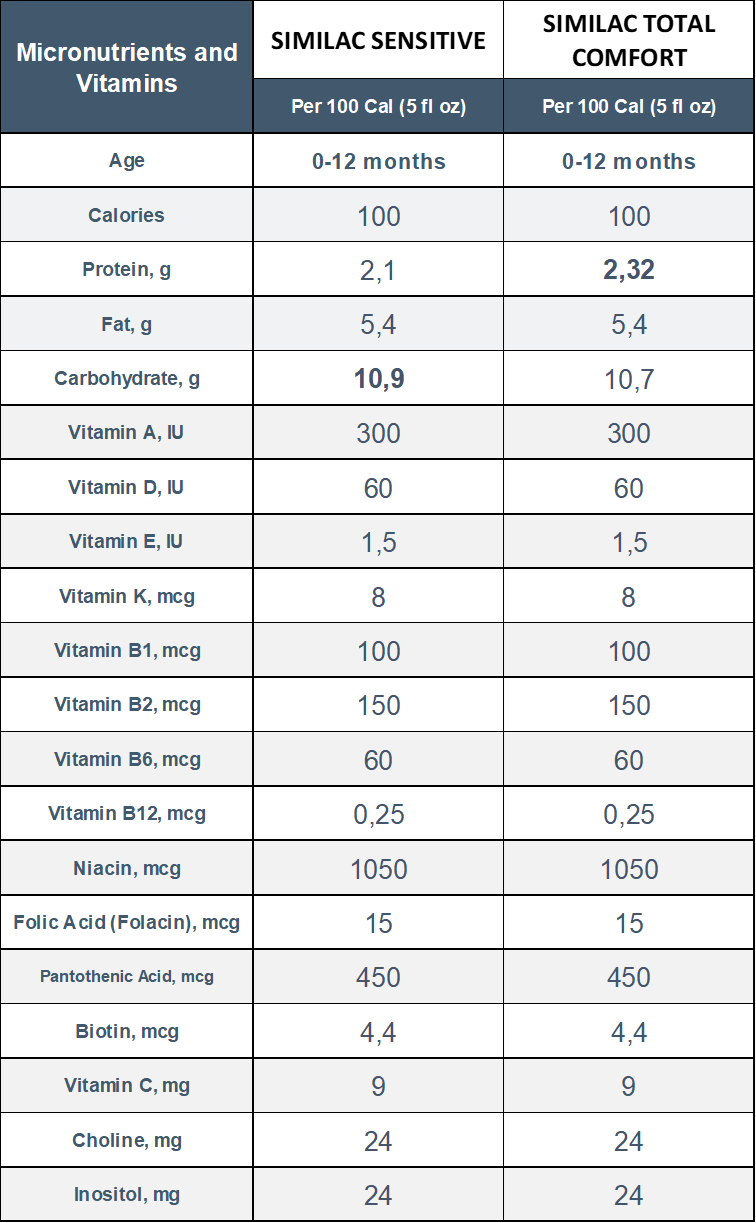
Micronutrients and Vitamins:
When it comes to micronutrients and vitamins, Similac Sensitive and Total Comfort have fairly similar profiles. They provide almost identical amounts of vitamins, including vitamins A, D, E, and K, as well as various B vitamins, niacin, folic acid, and more. However, Similac Sensitive has more carbohydrates while Similac Total Comfort has more protein.
The differences in the content between the two formulas are minor and unlikely to have a significant impact on the overall nutritional intake of your baby.
Therefore, the choice between these two formulas should primarily consider factors such as protein source, whey-to-casein ratio, and carbohydrate sources.
Minerals:
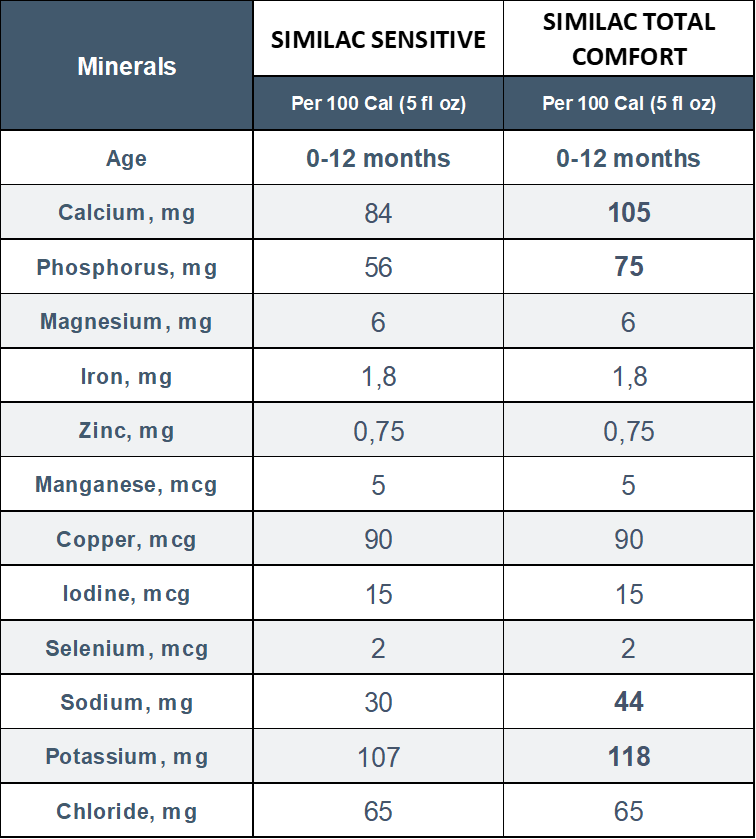
In terms of minerals, there are some differences, Similac Total Comfort provides slightly higher amounts of calcium, phosphorus, potassium, and sodium compared to Similac Sensitive. However, both formulas have similar levels of essential minerals such as magnesium, iron, zinc, manganese, copper, iodine, selenium, and chloride.
- Calcium: Essential for building strong bones and teeth, supporting muscle function, and aiding in blood clotting.
- Phosphorus: Works alongside calcium to strengthen bones and teeth, helps with energy metabolism, and is vital for cell function.
- Potassium: Regulates fluid balance, supports proper muscle and nerve function, and helps maintain healthy blood pressure.
- Sodium: Plays a crucial role in regulating fluid balance, nerve function, and muscle contractions, and is essential for overall body function.
Price Comparison:
Let’s compare Similac Sensitive and Similac Total Comfort in terms of price and related factors:
| Similac Total Comfort | Similac Sensitive |
|---|---|
12.6 oz 18.43 $ 1.54/oz | 12.5 oz 17.46 $ 1.40/oz 34.9 oz 37.92 $ 1.09 /oz 32 fl oz 7.82 $ 24.4 ¢/fl oz |
| 4.5 of 5.0 654 reviews | 4.6 of 5.0 2252 reviews |
| No RTF | Has RTF |
| Buy 12.6 oz HERE | Buy 12.5 oz HERE Buy 34.9 oz HERE Buy Ready-to-feed |
Price and Container Sizes:
- Similac Sensitive:
- The 12.5 oz container of Similac Sensitive is priced at $17.46, which amounts to approximately $1.40 per ounce.
- For those looking to purchase a larger quantity, there’s a 34.9 oz container available at $37.92, making it roughly $1.09 per ounce.
- Similac Total Comfort:
- Similac Total Comfort offers a 12.6 oz container for $18.43, equating to approximately $1.54 per ounce.
Similac Sensitive generally comes at a slightly lower cost per ounce, especially when opting for the larger container. However, the price difference per ounce between the two formulas is not substantial.
Ready-to-Feed:
One notable distinction between the two formulas is that Similac Sensitive is available in a ready-to-feed format, which can be convenient for parents who prefer not to mix and prepare powdered formula. Similac Total Comfort, on the other hand, does not have a ready-to-feed option.
Related: Similac Advance Vs Similac Total Comfort: Full Comparison
Parents Ratings:
- Similac Sensitive:
- Similac Sensitive boasts a commendable rating of 4.6 out of 5.0 based on a substantial number of reviews, with 2252 reviews contributing to this rating. This high rating indicates a generally positive reception among parents.
- Similac Total Comfort:
- Similac Total Comfort also enjoys a favorable rating of 4.5 out of 5.0, based on 643 reviews. While the number of reviews is lower than Similac Sensitive, the rating remains highly satisfactory.
Alternatives to Similac Total Comfort:
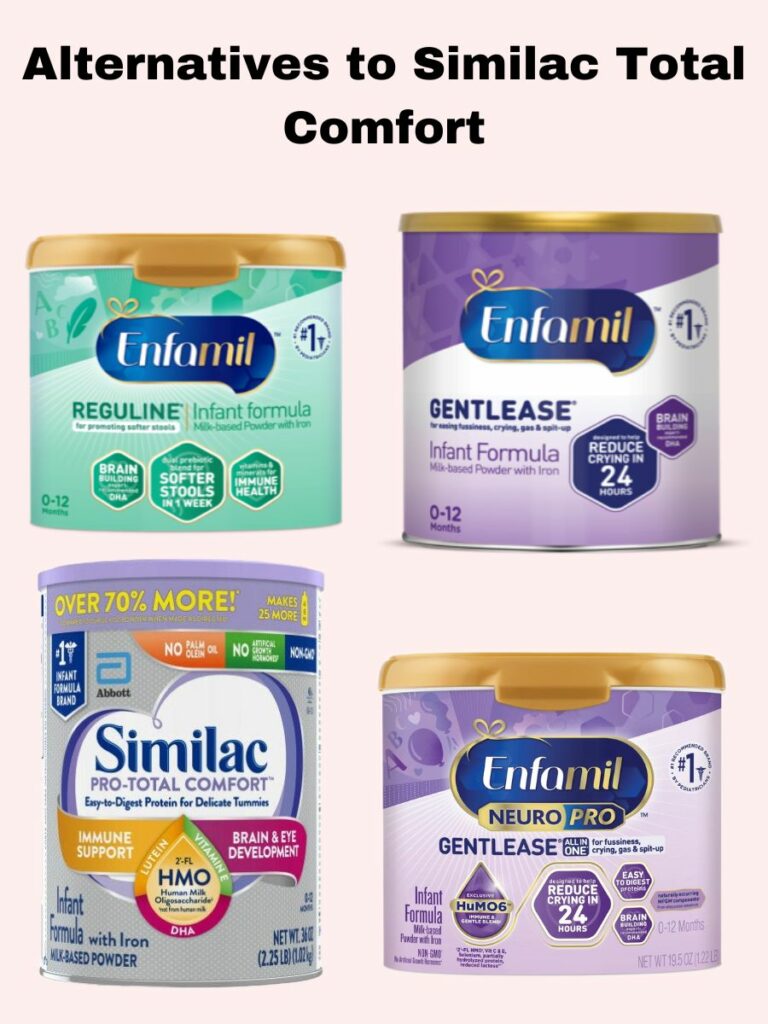
When it comes to choosing alternatives to Similac Total Comfort, it’s essential to consider formulas that cater to babies with sensitive tummies or digestive concerns. Here are some noteworthy alternatives to Similac Total Comfort:
- Similac Pro Total Comfort:
- Similac Pro Total Comfort is a formula from the same brand that offers similar benefits to Similac Total Comfort. It features partially hydrolyzed proteins for easy digestion and is suitable for babies with sensitive stomachs. It also includes the OptiGro blend for brain and eye development. This formula is a good choice for those who trust the Similac brand and want a closely related alternative. Read Similac Total Comfort Vs Pro Total Comfort.
- Enfamil Gentlease:
- Enfamil Gentlease is designed to reduce fussiness and gas in babies, making it an excellent choice for infants with digestive sensitivities. It contains partially broken-down proteins for easier digestion and is often recommended for gassy or colicky babies. Enfamil is a reputable brand with a long history in infant nutrition. Read Similac Total Comfort Vs. Enfamil Gentlease.
- Enfamil NeuroPro Gentlease:
- Enfamil NeuroPro Gentlease combines the benefits of Gentlease with Enfamil’s NeuroPro blend, which includes MFGM (Milk Fat Globule Membrane) for cognitive development. This formula is suitable for infants with fussiness or gas issues and provides added nutritional support for brain development.
- Enfamil Reguline:
- Enfamil Reguline is formulated to help promote regular bowel movements in infants. It contains a blend of prebiotics and a special type of protein to support digestive health and comfort. If your baby struggles with constipation or irregular bowel movements, this formula may be a suitable alternative.
Alternatives to Similac Sensitive:
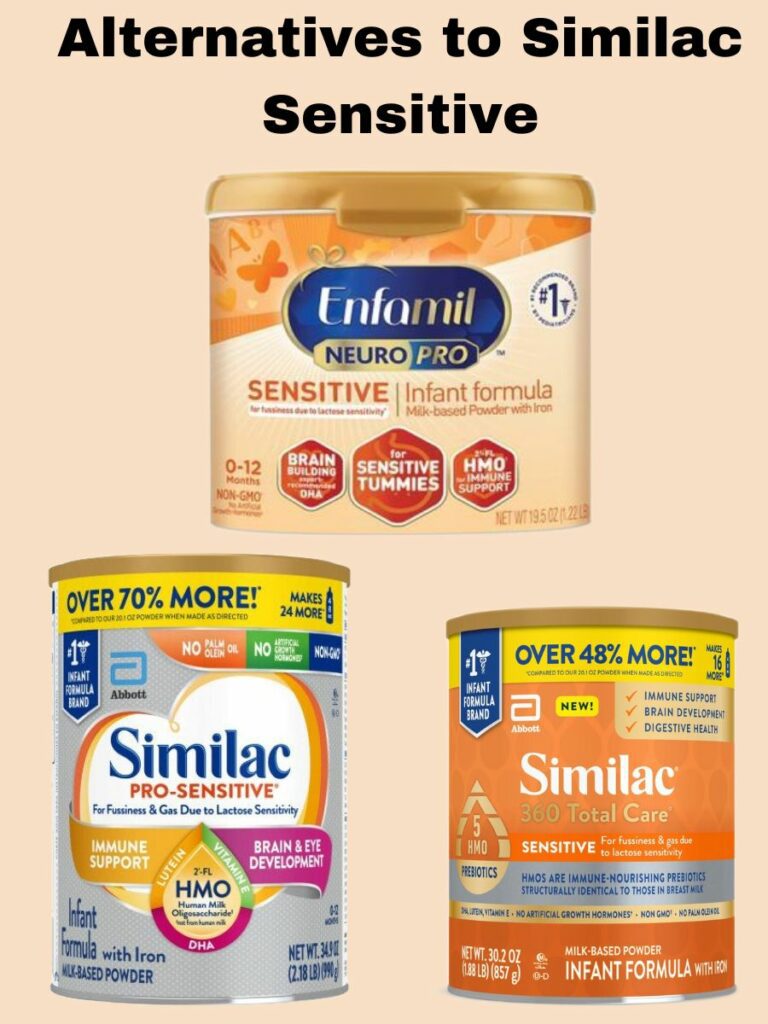
Choosing the right infant formula for your baby with sensitive digestion is crucial, and several alternatives to Similac Sensitive are available. Here, we’ll discuss some of the top alternatives:
- Similac Pro-Sensitive:
- Similac Pro-Sensitive is designed for babies with sensitive tummies. It contains 2′-FL HMO (Human Milk Oligosaccharide), which is an immune-nourishing prebiotic found in breast milk. This formula offers a balance of gentleness and essential nutrients to support your baby’s growth and immune system. Read Similac Sensitive Vs Similac Pro Sensitive.
- Similac 360 Total Care Sensitive:
- Similac 360 Total Care Sensitive is another alternative from the Similac brand that caters to sensitive infants. This formula focuses on holistic nutrition by addressing not only digestive concerns but also immune support, brain and eye development, and strong bones. It includes a blend of prebiotics, DHA, and other essential nutrients. Read Similac Sensitive Vs. 360 Total Care Sensitive.
- Enfamil NeuroPro Sensitive:
- Enfamil NeuroPro Sensitive is specially designed for babies with sensitive stomachs. It includes MFGM (Milk Fat Globule Membrane) and DHA for cognitive development. This formula aims to provide the necessary nutrients while being gentle on your baby’s digestion.
Switching Between Similac Sensitive and Similac Total Comfort:
If you’re considering switching between Similac Sensitive and Similac Total Comfort, here are some general steps to follow:
- Consult Your Pediatrician: Before making any formula changes, consult your pediatrician or healthcare provider. They can provide personalized advice based on your baby’s specific needs and any existing digestive concerns.
- Gradual Transition: If your healthcare provider approves the switch, it’s generally recommended to transition gradually. Start by mixing a small amount of the new formula (Similac Total Comfort) with the old formula (Similac Sensitive). Over several days or a week, gradually increase the proportion of the new formula while decreasing the old formula until your baby is fully on the new formula.
- Observe Your Baby: Pay close attention to how your baby reacts to the formula switch. Look for any signs of discomfort, digestive issues, or allergies. It may take some time for your baby’s digestive system to adjust to the new formula.
- Monitor Bowel Movements: Changes in formula can sometimes lead to changes in bowel movements. Keep an eye on your baby’s stool consistency and frequency during the transition.
- Stay Hydrated: Ensure your baby stays well-hydrated during the switch. Offer frequent feedings to prevent dehydration.
- Be Patient: Babies may take some time to adapt to a new formula. It’s normal for them to have an adjustment period. If you notice persistent discomfort or issues, consult your healthcare provider for further guidance.
Remember that every baby is unique, and what works well for one may not work for another. Your pediatrician is the best resource for guiding you through the transition and ensuring that your baby’s nutritional needs are met while keeping them comfortable and healthy.
Feel free to ask anything in the comments!!

